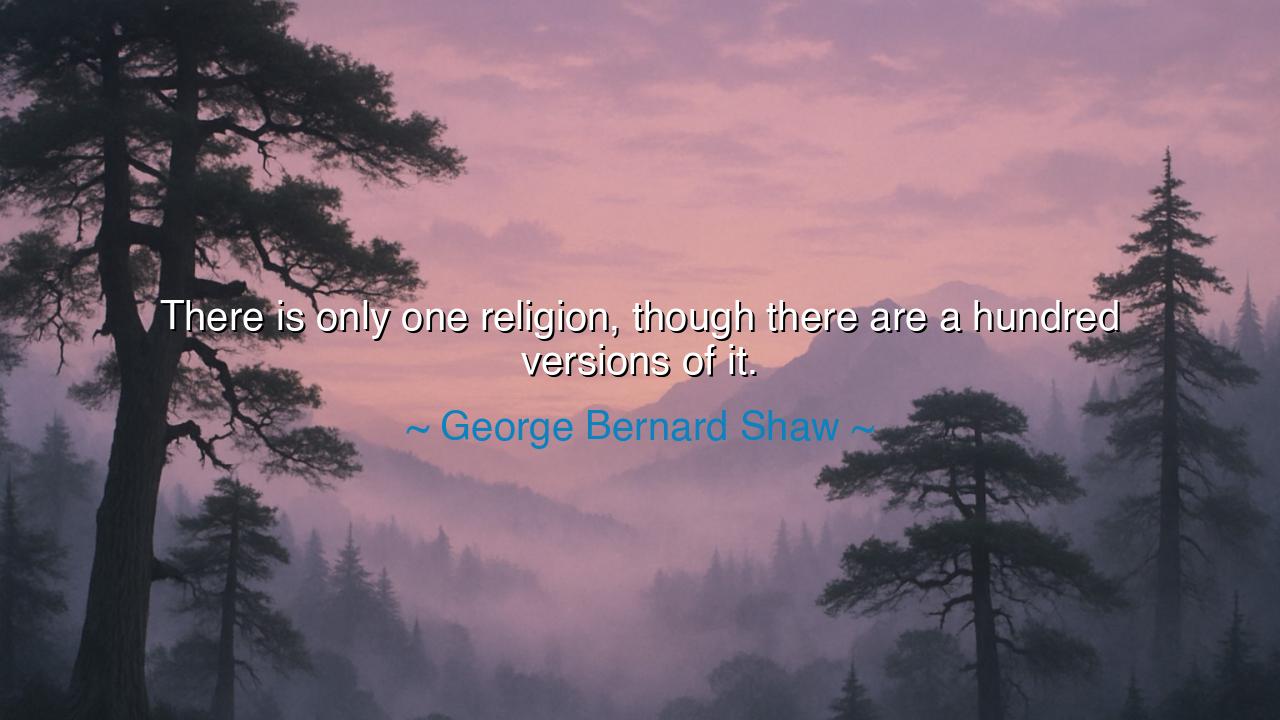
There is only one religion, though there are a hundred versions






In the vast expanse of human history, religion has been one of the most profound forces shaping the lives of countless generations. George Bernard Shaw, with his piercing insight, offers a powerful reflection on the nature of faith: “There is only one religion, though there are a hundred versions of it.” These words speak not just to the multiplicity of religious expressions across the globe, but to the universal essence that underlies them all—a shared quest for meaning, purpose, and connection with the divine. Despite the vast array of beliefs and practices, Shaw’s assertion invites us to consider that, at their core, all religions seek to answer the same fundamental questions of existence, suffering, and transcendence.
From the earliest times, humans have sought understanding in the face of the unknown. The ancient Sumerians looked to their gods to explain the changing of seasons and the flow of the rivers; the Egyptians sought guidance from their gods on how to navigate the afterlife; the Greeks and Romans too, with their pantheons of gods, sought answers to the mysteries of life and death. While their beliefs differed in form and practice, each religion shared a fundamental desire to comprehend the divine forces that shaped their world. Shaw’s words remind us that despite the variations in rituals and doctrines, the central longing of humanity remains the same: to seek connection with something greater than ourselves.
Consider, for example, the story of Mahatma Gandhi, whose life was guided by a deep spiritual understanding of humanity’s unity. Though he was born into the Hindu faith, Gandhi saw the truth in all religions, emphasizing that at their core, they sought the same virtues: love, compassion, and truth. Gandhi’s famous quote, “I believe in the essential unity of all religions,” resonates deeply with Shaw’s perspective. Gandhi did not see the differences between religions as barriers but as expressions of the same universal human quest for righteousness and peace. To him, religion was a path that transcended the boundaries of culture and geography, and his life became a testament to the idea that spirituality is about living according to universal principles of goodness, regardless of the form it takes.
The Christianity of Jesus Christ, the Islam of the Prophet Muhammad, the Buddhism of the Buddha, and the Hinduism of the ancient sages—these religions, though distinct in their practices and beliefs, all seek to guide their followers toward a higher understanding of love, compassion, and peace. Shaw’s quote invites us to look past the outward appearances of each religion and to focus on the inner essence they share. The rituals, prayers, and doctrines may differ, but the spiritual core of each is driven by the same human longing for transcendence and connection with the divine.
The wisdom of Shaw is echoed in the words of the Dalai Lama, who reminds us that compassion is the essence of all religions. He states, “We all have the same potential to make this world a better place,” emphasizing that regardless of the religious framework we follow, our actions must be guided by kindness, peace, and understanding. Just as Jesus taught that the greatest commandment is to love thy neighbor, and Muhammad taught that mercy is the essence of God, these core principles show that religion, at its highest form, is not about divisions but about the unity of purpose that binds us all together.
This understanding calls us to live with open hearts and minds, to embrace the shared humanity that lies at the heart of every faith. Shaw’s words remind us that religion is not about conflict or division, but about a common search for the truth that transcends human frailty. Whether we follow the way of the Buddha, the teachings of Muhammad, or the life of Christ, the fundamental principles of love, service, and truth unite us all. It is in these shared values that we can build bridges across the divides of belief, creating a world where compassion and understanding reign.
The lesson from Shaw’s words is one of unity, not division. Let us not be bound by the differences that separate us but instead embrace the universal truth that underlies all religions. In our daily lives, let us cultivate the virtues of compassion, patience, and understanding, recognizing that at the core of every faith, there lies a universal longing for peace and love. Let us seek to live our lives as reflections of these values, not just within our own religious communities, but in our interactions with all people, regardless of their beliefs. In doing so, we honor the shared spirit of humanity and move closer to the unity and peace that Shaw envisioned.






AAdministratorAdministrator
Welcome, honored guests. Please leave a comment, we will respond soon